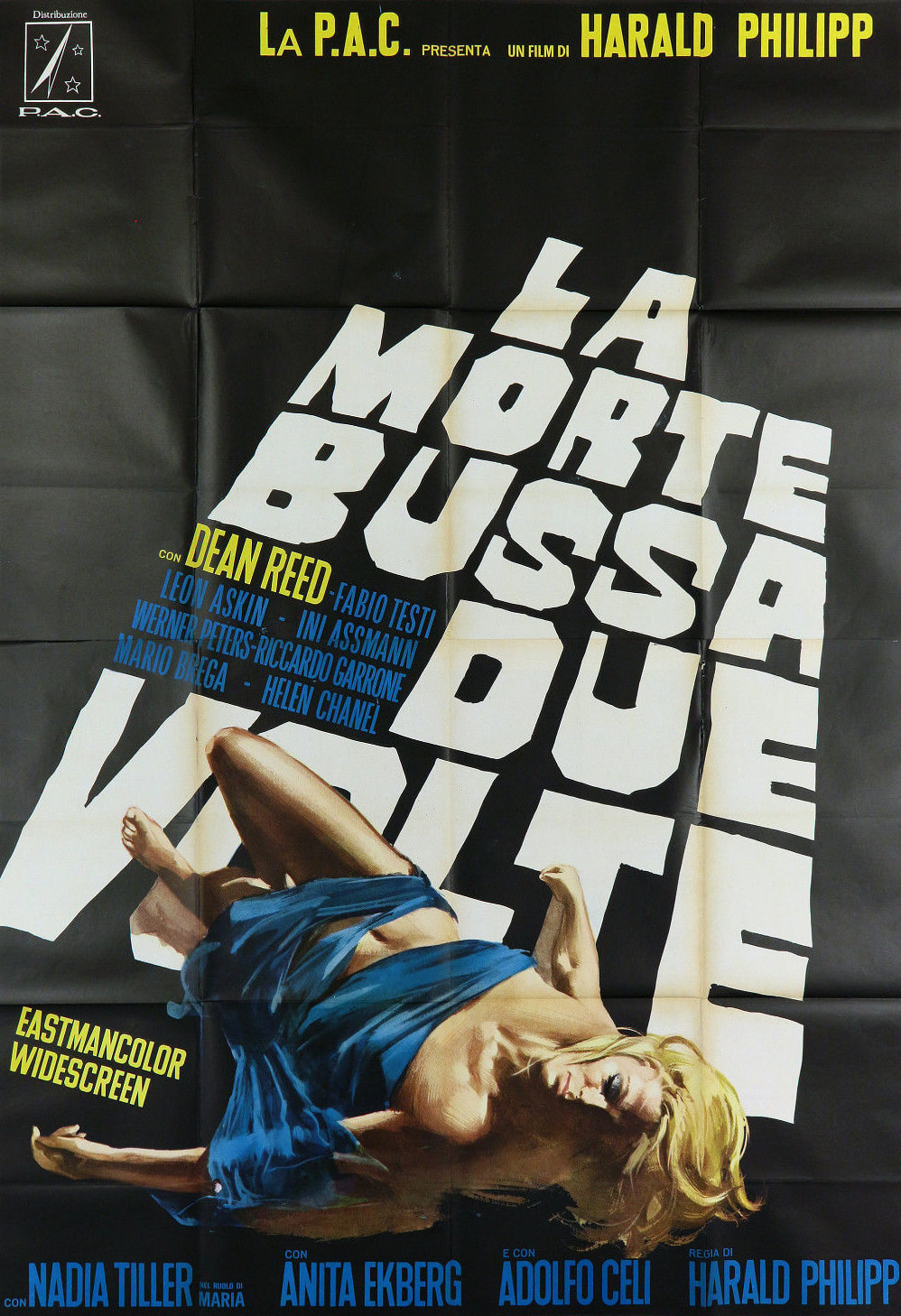Francisco Villaverde is a rich young artist who likes to play around with women who aren't his wife. He also has a nasty habit of taking things too far and strangling these women. When he chokes a Mrs Simmons mid-coitus, with two witnesses no less, you'd think his philandering days are at an end, but not a bit of it. Mrs Simmons' husband (Mr Simmons) hires some detectives to investigate, and they figure out whodunnit pretty damn quickly, but they need proof of Villaverde's guilt. Instead of doing any further detecting, they decide to send one of the dicks' fiancée undercover to hang out with Villaverde and essentially sit back to let nature take its course. Oh, and then there's the illegal bank, headed by Adolfo Celi and Anita Ekberg, who are trying to call in an illegal loan which was given to a local hotelier and his partner, who was one of the witnesses of the initial illegal strangling. After some spy film-esque hijinks the truth outs, and Francisco is free to keep on womanising. Except then he isn't, he dies. The end.
Alright, this isn't totally ungiallo-like: there is kind of a murder mystery at the centre of the film, plus the whole thing takes place in exotic seaside locales beloved of the filone in the late 60s. It's the sort of film which if made a year or two later would've been totally different, but as is it very much straddles the giallo/spy film divide (before toppling over onto the spy film side). The title, which naturally bears no relevance to anything that occurs on screen (you could probably come up with a somewhat convincing explanation to link it to what happens, but come on, you're better than that), is definitely the most gialloey thing about it, with only sparse rations of yellow illiberally sprinkled here and there to complement it.
The opening dialogue-free scene does contain a murder, albeit one in which we (apparently) see the murderer in broad moonlight. The scene - which contains the bulk of the film's nudity courtesy of the ever-reliable Femi Benussi - is somewhat awkwardly shot and edited, with some early shots seeming to include a few frames of the actors waiting to hear the call of "Action." From here on, though, the editing is a lot tighter, although that's probably down to the somewhat-cut print I watched.
The fact that the available print is cut means one is forced to become an active viewer, doing a bit of sleuthing and deductive reasoning simply in order to figure out what exactly is going on. Removing the exposition which links A to B requires the viewer to be attentive and engaged so they can join the dots of the plot themselves. Here, there are a lot of characters in the mix, so figuring out who everyone is and what motivates them is half of the battle. In fact, there are so many things going on that Dean Reed, the nominal hero, is barely in the second half of the film (at least the version I watched).
Fabio Testi, in an early role as Villaverde, is mainly required to look sexy (tick!) and alternate between horny and confused, which wouldn't really stretch many actors. Nonetheless, he's more than up to the task - a task which actually, the more I think of it, isn't all that easy. His character is very obviously nuts - take the painting he happily exhibits of a nude and dead Mrs Simmons. He makes no real effort to deny that she's the subject of the painting, and even if he did the fact that he included the necklace which was stolen from her corpse is a dead (!) giveaway. He seems to have some kind of kinky 'agreement' with his wife (or else she's been browbeaten over time, or maybe she just likes his money and is willing to put up with whatevs to get it) to facilitate his womanising. And in order to practise this womanising, he has to convey enough sexiness to make it believable that a lunatic could seduce such ladies as Anita Ekberg's Mrs Ferretti, something Testi manages to pull off, in every sense.
And yes, Mrs Ferretti does prove susceptible to his charms - the film contains a lot of spouses carrying on behind their spouses' backs. (And also a lot of spouses knowing their spouses are carrying on behind their spouses’ backs - the makers of this film were clearly struggling to get their heads around the sexy possibilities presented by the advent of Free Love). They might have been better advised putting a bit more work into the logic of the film; the way the 'heroic' detectives toss Ini Assmann's (great name) Ellen into the lion's den (aka Fabio Testi's bedroom) beggars belief, and the subplot (which essentially becomes the main plot) about the dodgy loan doesn't really convince. Even the supposedly downbeat finale, which sees the detectives climbing atop a high horse to decry one of the characters' deceptiveness, isn't thought through: in real terms, they've just punished someone by refusing to charge them for services rendered. I'm not saying the makers of this film shouldn't have been paid for their rendered services, but they shouldn't have been paid much. And it should have taken the form of a loan, repayable at 150% interest within seven days.

 RSS Feed
RSS Feed
